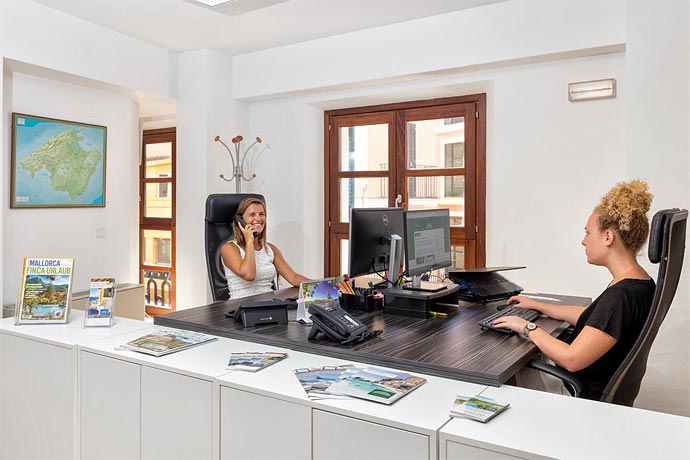Using a holiday rental apartment as a home office is currently very popular but it is, however, advisable, never to rent a holiday home privately if you do not know the alleged owners.
by Stefanie Claudia Müller
Fourty year-old Pablo Cerda has experienced many criminal activities during his profession as an actor and filmmaker and has read about many unpleasant tricks, but has himself become the victim of a confidence trick in the normally safe Spanish capital of Madrid. Just as there are fake profiles appearing in dating portals when criminals exploit people’s loneliness, there are also gangs who use false advertisements to entice globetrotters like Cerda who do not have the time to view apartments themselves directly, but can afford to pay a deposit. He lives and works in Santiago de Chile, but often lives elsewhere for a short time for professional reasons.
Often the scammers say that they live abroad themselves and, therefore, cannot arrange an appointment to view the property but will send the keys by post. In cities such as Berlin there have also been cases where you are invited you to view the flat, but then after you have paid the deposit the locks are changed, or it turns out that others already live there.

Always hace a personal viewing before renting a flat!
These apartment scammers generally have the same methods – the properties offered are of a high quality and very cheap, immediately drawing the attention of the potential renters. Cerda was looking for accommodation which should be located in Madrid’s district of the “Barrio de Las Letras”, and for a monthly rent of 500 euros the studio advertised looked like an absolute bargain. He found the ad in the real estate portal Idealista, the market leader in Spain, 80 percent of which had just been sold to investors for 1.3 billion euros.
“Who would have expected that they had no control over anything there,”
says Cerda. He filed a complaint with the police and even went to the address, but someone else lived in the apartment:
“Suddenly I realised how cleverly everything had been arranged,”
said Cerda.
Never rent privately without having seen the property
Holiday real estate expert Claudia Haubner warns her customers time and again:
“Anyone looking for a home for their holidays or for longer stays abroad should never contact the owner privately, and definitely never make payments by bank transfer. He should always use a reputable rental portal which assures the security of every transaction and must assume responsibility in the event of fraud.”
The positive fact with renowned estate agents such as Porta Mallorquina or holiday home brokers such as Porta Holiday is that they know their properties. In the case of other providers, such as Airbnb, the rental does not go through the alleged owner of the flat or house, but directly through the portal thus ensuring the transparency of the details of both parties.
In contrast to pure display portals such as Idealista the complete data of both the landlord and the tenant is stored digitally. Thanks to the rating systems for the guest and the host disappointment upon arrival will be minimalised as both will try to behave as correctly as possible in order to protect themselves.

The positive fact with renowned estate agents such as Porta Mallorquina or holiday home brokers such as Porta Holiday is that they know their properties.
In the case of Cerda, however, there was neither owner nor apartment: “The alleged owner wrote to me and told me that she lived on Tenerife, giving me many personal details – that should have made me think”. In this case, however, he surprised himself with his own naivety but since losing his deposit of 1000 euros, he has become very distrustful during his further search for accommodation:
“Now I will always look at the apartment or operate through portals where the agent knows the owners”.
This is the case with Porta Mallorquina, for example, where only properties from its own portfolio are advertised. Disappointments like that experienced by Cerda hurt even more after experiencing the hard Spanish lockdown which he spent closed up in a small room in Madrid:
“After two months of being locked up, I longed for light and space. It’s all very expensive and the demands are enormous for freelancers like myself who are looking for an apartment for a year. I think that’s probably one reason why I was taken in.”
Increase in false reports of fraud in pandemic periods
The Spanish cyber expert José Ignacio San Segundo López reported to the Efe news agency about a clear increase in these nasty practices. Sometimes, as in the case of Cerda, complete addresses, names and telephone numbers of the owners are being revealed in order to create trust but once the deal is done no one can be reached via this route. Particularly during the lockdown in Spain, when the estate agents could not work and viewings were not possible, these scams increased.
“Everyone should always examine the ad to establish if it is genuine, especially in the case of exceptional offers accompanied by super photos”
warns police officer San Segundo López. Time and again the Spanish police manage to detect some of the gangs, but even in these case the victims usually never see their money again. That is why he advises:
“One way to protect yourself is to copy the pictures of the apartment and put them into search engines”.
If they then appear in a different context, they are “stolen” photos. Now the criminals have become so audacious that they also steal photos from intermediaries such as Porta Holiday, thereby also damaging the reputation of the serious providers.
The criminals are also active in Germany
False property advertisements are not only a Spanish problem as the trick is practiced worldwide. The German consumer advice centre also warns that, as in the case of Cerda, data from contact with customers is stolen. The Chilean even sent account statements to prove his liquidity. Posing as real estate portals such as Fotocasa, the fraudsters increasingly send so-called phishing e-mails to spy out customers. These are usually instructed to log in to a well-known real estate portal using a link sent along with the access data. When doing this, however, they arrive on a fake log-in page and attached files can also contain viruses. By email Cerda was also politely asked for information concerning his profession. He unsuspectingly gave the information as it seemed reasonable to him that the property owner wanted to protect himself as he could not meet the renter in person.
Deike Werner from Berlin reported, in her search for an apartment in the German capital, several cases where a copy of her passport and salary information was requested to be sent in advance. This she innocently sent by email: “Before paying the deposit, however, I suspected that something was wrong as I was not able to view the apartment and the owner was also very difficult to reach”.

Photo of the falsly advertised apartment to Pablo Cerda
Even though the co-founder of Idealista, Fernando Encinar, warned about the apartment scammers in an interview, Cerda believes that large providers like this one should not simply be able to shirk their responsibilities:
“They should have to examine their customers, even if it is by means of the use of algorithms which can check the authenticity of the photos or data. This is, after all, about real estate and not about small items sold on ebay where the damage is containable”.
Even though Cerda has now overcome the shock and anger over his own stupidity, the Chilean still hopes to track down the fraudsters:
“The police are trying to get hold of them using the bank account data which gives a full name”.
His money will probably still be lost:
“In any case, this painful experience has served me as inspiration for future film scripts”.
